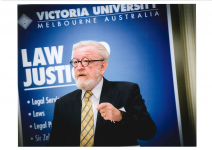Towards a Regulated Drug Market: An Interview With Robert Richter QC

Human beings have been using psychoactive substances since prehistoric times. The use of opium, mushrooms, psychedelic cacti and alcohol has gone on for millennia. You might say that drug use has gone hand in hand with the progress of civilisation into the modern day.
The system of drug prohibition that we are living under globally right now is actually an anomaly. For the most part, what are referred to as illicit substances nowadays, were actually legal – or either non-existent – until about a century or so ago.
The 1961 United Nations Single Convention on Narcotic Drugs is the key treaty of the modern drug prohibition system. It consolidated a series of international drug treaties that were established over the 50 years prior to its adoption, including the 1925 Geneva Convention.
In 1971, Nixon launched the drug war: the intensification of the law enforcement side of drug prohibition. And in 2011, the former heads of state and leading intellectuals that made up the Global Commission on Drug Policy declared, “The global war on drugs has failed.”
Evidence-based approaches
One of the major failures of the war on drugs is that it not only increased drug use, but it also heightened the harms associated with their use. And due to this, a set of policies and practices known as harm reduction has developed in order to minimise the negative aspects of drug use.
Because of the illegality of drugs, politicians tend to oppose these life-saving approaches. This is evident in the refusal of governments around Australia – except for the enlightened one in the ACT – to consider implementing pill testing services, which most of the community would like to see.
Five young Australians have died at music festivals in NSW since September last year. And despite the evidence that pill testing has been working in certain European nations since the 1990s, the Berejiklian government’s response has been to ban festivals.
Following this approach, instead of implementing mandatory seat belts in the early 70s to prevent fatalities, state governments should have just banned cars. The difference in these examples is that cars aren’t illegal, but MDMA is, and therefore, there’s no quality control governing its production.
Supervised injecting sites save lives
Renowned criminal defence barrister Robert Richter QC was a decades-long supporter of a safe injecting facility for Melbourne. And the Victorian president of the Australian Drug Law Reform Foundation was a key figure in the campaign that saw one open in North Richmond last June.
Known for taking on high-profile cases, including defendants who are unpopular in public opinion, Mr Richter has often cited the success of the medically supervised injecting centre in Kings Cross, which has prevented over 6,000 potentially fatal overdoses since it opened in 2001.
Sydney Criminal Lawyers spoke to Mr Richter about the outcomes the war on drugs has produced, the fact that recreational cannabis use is still outlawed in this country and whether he believes the decriminalisation of drug use and possession is an end in itself.
Firstly, the war of drugs has been waged for close to 50 years. Mr Richter, in your opinion, what has been the overall effect of prohibition and the drug war?
The overall effect of prohibition and the drug war has been exactly the same as the prohibition of alcohol and the war against alcohol in the 20s in America.
It has created a world of organised crime that should never have come into existence. It has converted what was a health issue into a punitive legal issue that sees our gaols filled with people who should not be in prison.
And it has done enormous damage to people who have wanted to cease an addiction, but are prohibited and proscribed by the absence of any proper facilities to help them, since all resources are directed at the unachievable elimination of drugs.
The harm reduction issue that has been front and centre over the last six months has been pill testing.
In NSW, five young Australians have died at festivals due to drugs. However, NSW premier Gladys Berejiklian and her Victorian counterpart Daniel Andrews have refused to consider this harm reduction approach.
What do you think about the reluctance of these politicians to even consider an approach that has been utilised in Europe for decades?
It’s part of this absurd notion that we can eliminate drug use, or that pill testing encourages drug use. People will use drugs, and it is our obligation to see to it that there are no unintended fatalities associated with it.
Pill testing in a situation, such as concerts and the like, where we know people are going to use drugs, is essential, because people don’t know what they’re putting into their stomachs, which may in fact be lethal, as we have seen.
When politicians talk about trying to save lives, they don’t take that into account. It’s like saying we want to eliminate traffic deaths on the road by banning cars. It won’t happen. It can’t happen.
And the way to deal with it is to provide better ways to save lives, and that includes injecting centres for addicts. I don’t mean an invitation for non-addicts to come and use drugs. I mean proper injecting facilities for drug addicts, so they can be kept alive long enough to give up their habits.
As well as, pill testing for experimental young people who don’t know what they’re putting into their system.
Veteran Australian drug law reformer Dr Alex Wodak has put forth that the main drug being taken by festivalgoers around the country, MDMA, should be legalised and regulated. Former Australian Federal Police commissioner Mick Palmer has backed this call.
What’s your position on such a proposal?
Absolutely the same. It’s the only sensible thing to do. And the only way to preserve people from overdosing and dying.
MDMA taken appropriately is not a death sentence and is not particularly addictive. It can be regulated. It ought to be regulated.
There should be distinctions made between different drugs. I have problems with ice, in terms of legalising it. But, ice is really a consequence of the prohibition of things like MDMA. And it’s a consequence of the whole drug philosophy that has been in place for many, many years.
The attitude ought to be one of looking at science – looking at health experts and what they say and recommend. Looking at enlightened countries that have decriminalised and what the consequences of that has been, because we will find that the consequences have been salubrious.
There are also strong calls for the legalisation of cannabis in this country. It’s a drug that was added to the 1925 Geneva Convention as a last minute addition to prohibitions on opium and cocaine.
In the US, 10 states have now legalised the recreational use of cannabis. And in the ACT at present, there’s a bill before parliament that’s likely to see the legalisation of personal possession and use.
What do you think about a drug like cannabis still being prohibited in Australia?
It’s stupid. If you look at what’s happening in California and a whole lot of other jurisdictions, where it’s being legalised to the same extent as tobacco and has been regulated, it brings in the revenue and causes no harm, because it eliminates a good portion of the black market, which is run by criminals.
As you’ve already touched upon, you advocated for the establishment of a safe injecting room in North Richmond for many years. The Andrews government eventually came to the table in October 2017 and now the facility is in operation.
What did you think when this eventually came about? And why were you such a strong supporter of the centre?
I was delighted, as I know, in its very short life, the injecting centre in Richmond has probably saved about three hundred lives. There have been at least six hundred overdoses at the centre, which have been revived. No one has died. No one was injured.
Whereas, if those six hundred people had used it in some back alley, maybe half of them would be dead.
So, if there is a reliance on the need to protect the sanctity of life, that has saved a lot of lives. And we need several more injecting centres in Victoria – certainly in Melbourne – in areas where lives will continue to be saved by their use.
In NSW at Kings Cross, the numbers of lives saved goes into the thousands. And I think politicians are total hypocrites when they talk about their concerns for the preservation of life and ignore effective modes of dealing with that issue.
So, what would you say are the most pressing harm reduction/drug law reform issues at present?
Right away, I would say increase the number of safe injecting centres, increase the number of funded facilities that deal with people who want to beat their addiction and help them. Divert the funds from senseless repression into healing.
And certainly, pill testing is one of the steps that will save lives.
You support the decriminalisation of personal drug use and possession, much like the Portuguese model.
But, do you consider this an end in itself, or do you think that there’s a need to move further towards a regulated market in regard to illicit substances?
We need to have a regulated market, in the sense that when you decriminalise, you still don’t allow children under 18 to go and get them. You shouldn’t.
But, if they do, you deal with them in a child offending setting, which is very different from the criminal law setting.
The fact is, it is not a free go, it is not a recommendation, any more than legalising abortion makes it compulsory to have an abortion.
Children and older people will experiment and continue to use drugs. We deal with children in one sense by saying, “You’re not allowed to have them.”
But, with adults we say, “OK. It’s legal. But, certain other activities associated with it are not. And if you need help with your addiction, we will give it.”
So, you regulate the market in the same way as tobacco. You tax it. You use the funds to help addicts.
And lastly, Mr Richter, how do you think that sort of change will come about?
Only when politicians have a moment on the road to Damascus and realise that we’ve been on the wrong track for the last 50 years at least.
And I don’t hold out much hope for that. But, we have to keep fighting.







